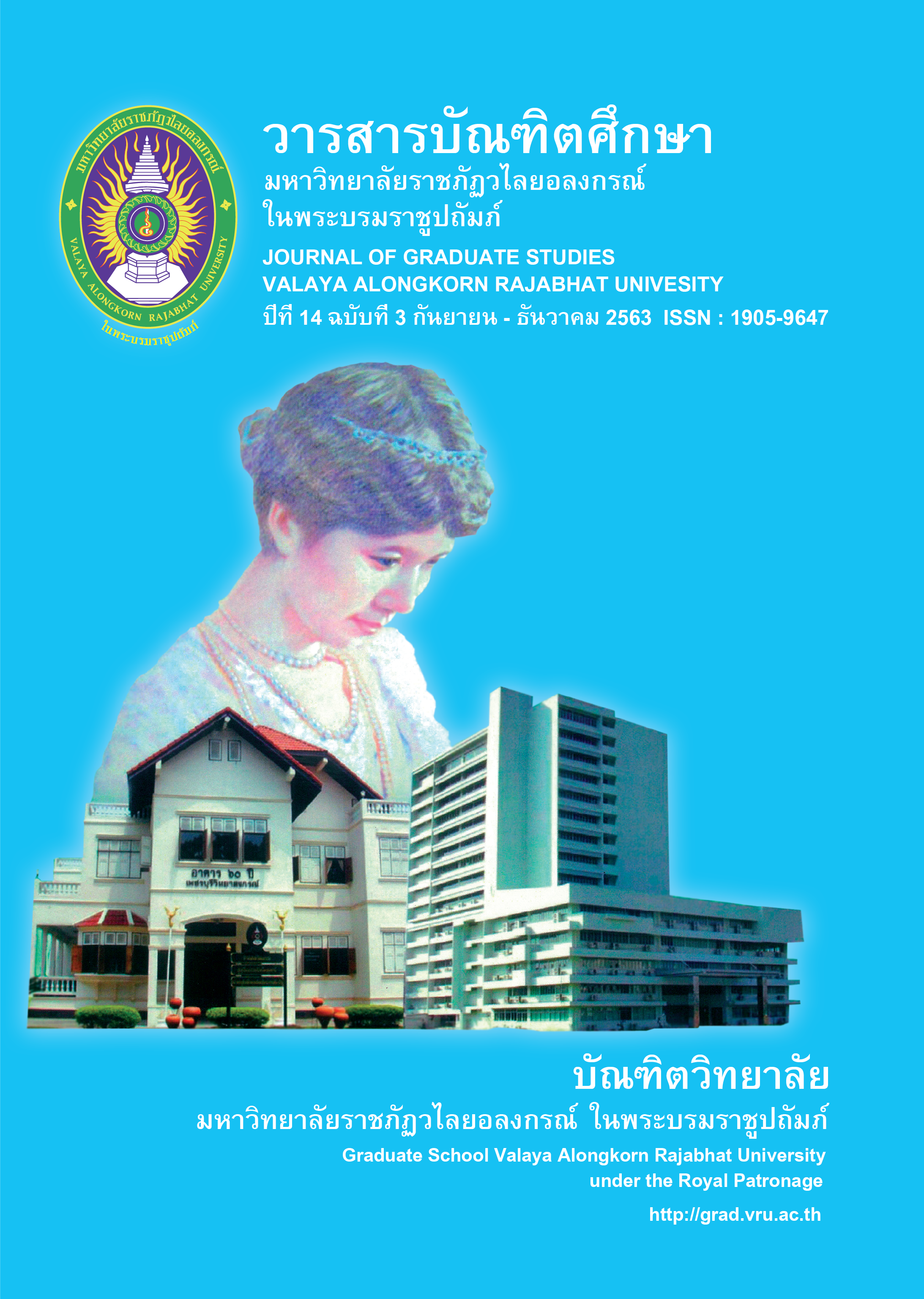MEANING AND MAINTENANCE OF IDENTITY PHYSICAL EDUCATION STUDENTS FACULTY OF PHYSICAL EDUCATION, SRINAKHARINWIROT UNIVERSITY
Main Article Content
Abstract
This research was aimed to 1) study the meaning and origin of the meaning, the identity of students in the Department of Physical Education, Faculty of Physical Education, Srinakharinwirot University, and 2) study the identity maintenance of students in Department of Physical Education, Faculty of Physical Education, Srinakharinwirot University. This research is qualitative research using the method of grounded theory, collecting data through in-depth interviews, observation and recording, document analysis, and related research. Data were analyzed by the interpretation method. And interpret the data the main informants were 18 students of the Department of Physical Education, Faculty of Physical Education, Srinakharinwirot University. 1) The results of this study found 1. Gentle but not weak. 2. Self-Discipline. 3. Honesty. 4. Respect for each other. 2) The identity maintenance of students in Physical Education Department is having good mental characteristics because there is training taught by teachers and students like to play sports on a regular basis. Therefore, it is a fusion to maintain the identity of students of the Department of Physical Education.
Article Details

This work is licensed under a Creative Commons Attribution-NonCommercial-NoDerivatives 4.0 International License.
บทความทุกเรื่องได้รับการตรวจความถูกต้องทางวิชาการโดยผู้ทรงคุณวุฒิ ทรรศนะและข้อคิดเห็นในบทความ Journal of Global of Perspectives in Humanities and Social Sciences (J-GPHSS) มิใช่เป็นทรรศนะและความคิดของผู้จัดทำจึงมิใช่ความรับผิดชอบของบัณฑิตวิทยาลัย มหาวิทยาลัยราชภัฏวไลยอลงกรณ์ ในพระบรมราชูปถัมภ์ กองบรรณาธิการไม่สงวนสิทธิ์การคัดลอก แต่ให้อ้างอิงแหล่งที่มา
References
Bunbut, C. (2012). kānsāng samatthaphāp thāng kāI [Physical fitness]. Bangkok: Ramkhamhaeng university press.
Chareonwongsak, K. (1998). Mahā witthayālai thīthāngyǣk: Čhutprakāi wisaithat ʻudomsưksāthainaiʻ anākhot [The University at the Crossroads: Inspiring Future Thai Higher Education Vision]. Bangkok: success media.
Charmaz, K. (2006). Constructing grounded theory: A practical guide through qualitative analysis. London: Sage.
Chotchuang, S. (2011). Kānsưksā saphāp kānphattha nāʻ atlak læ ekkaluk khǭngsathānsưksā Sangkatsamnakngān khētphư̄̄nthī kānsưksā prathomsưksā phitsanulōk Khēt Nưng [A study of the conditions for the development of identity and identity of the school Under the Office of Primary Education Area Phitsanulok, Area 1]. Master’s thesis. Naresuan University.
Chung, Y. & Runsheng, S. (2019). The role Instagram in the UNESCO’s creative city of gastronomy: A case study of Macau. Tourism Management. 75(2019), 257-268.
Cox, R. (2012). Sport psychology: Concepts and applications. 7th Ed. New York: McGrew-Hill.
Fuangfoosakun, A. (2003). Atlak [Identity]. Bangkok: National Research council of Thailand.
Gould, D., Dieffenbach, K., & Moffett, A. (2002). Psychological characteristics and their development in Olympic champions. Journal of Applied Sport Psychology. 14(3), 172–204.
Jenkins, R. (2004). Social Identity. London, New York: Routledge.
Khampha, N., Kingkham, V., & Yooyen, V. (2015). Atlak choēngbūak fǣngnai choēngloptǭ Khonphikān: Khwāmsamphan rawāng phāsā kapʻ atlak khǭng khonphikān naisangkhom thai [Positive Identity with Negative Implications of the Disabled: The Relationship between Language and Identity of the Disabled in Thai Society]. Silpakorn University Journal. 35(1), 125-148.
McNamee, M. J., &. Parry, S. J. (1998). Ethics and Sport. New York: Routledge.
Ministry of Tourism and Sports. (2017). Phǣnphatthanākānkīlāhǣngchāt Chabapthī Hok (Phǭsǭ 2560 - 2564) [National Sports Development Plan No.6 (2560 - 2564)]. Bangkok: Office Printing Business. WVO Nationals.
Nonjuy, N., Pukdeewong, P., & Lincharearn, A. (2017). Rūp bǣp kitkamkān soēmsang khwā mī nāmčhai nak kīlā khǭng naksưksā mahāwitthayālai thēknōlōyī rātmongkol lānnā [The Activities Model Sportsmanship Promotion of Rajamangala University of Technology Lanna Students]. The Golden Teak: Humanity and Social Science Journal. 23(3), 107 – 123.
Office of the Higher Education Commission. (2015). Khūmư̄̄kānprakan khunnaphāp phāinai radapʻudomsưksā chabappī kānsưksā [A Guide to Internal Quality Assurance in Higher Education, Academic Year 2014]. Retrieved from www.qa.psu.ac.th/document/58/iqa_2558.pdf.
Podhisita, C. (2005). Sāt læ sin hǣngkān wičhai choēngkhunnaphāp [Science and art of quality research]. 5th ed. Bangkok: Amarin printing and publishing.
Princess Maha Chakri Sirindhorn Anthropology Centre, (2004). Wātkamʻatlak [Identity discourse]. Bangkok: O.S. Printing House.
Shin, T., Park, R., & Kim, D. (2012). The psychological intervention program for the disabled shooting athletes in Korea. International Journal of Business andSocial Science. 3(18), 8–15.
Siriwong, P. (2004). Tritdīthānrāk (Grounded Theory) Withī witthayā kānwičhai phư̄asāng tritdī naikān phatthanāprathed [Grounded Theory Research Methodology for Developing Theory in National Development]. SU.T Bulletin. 19(1), 13-21.
Smith, E. R., Schutz, W. R., Smoll, L. F., & Ptacek, J. (1995). Development and validation of a multidimensional measure of sport-specific psychological skills: The Athletic Coping Skills Inventory-28. Journal of Sport & Exercise Psychology. 17(4), 379-398.
Stuart, H. (1997). Representation: Cultural representation and signifying practices. London: SAGE Publication Ltd.
Stuart, H., & Paul, D. G. (1996). Question of cultural identity. (eds): London: SAGE Publications Ltd.
Suwanwela, C. (1997). Bonsēnthāng ʻudomsưksā [On the higher education path]. Bangkok: Chulalongkorn university press.


